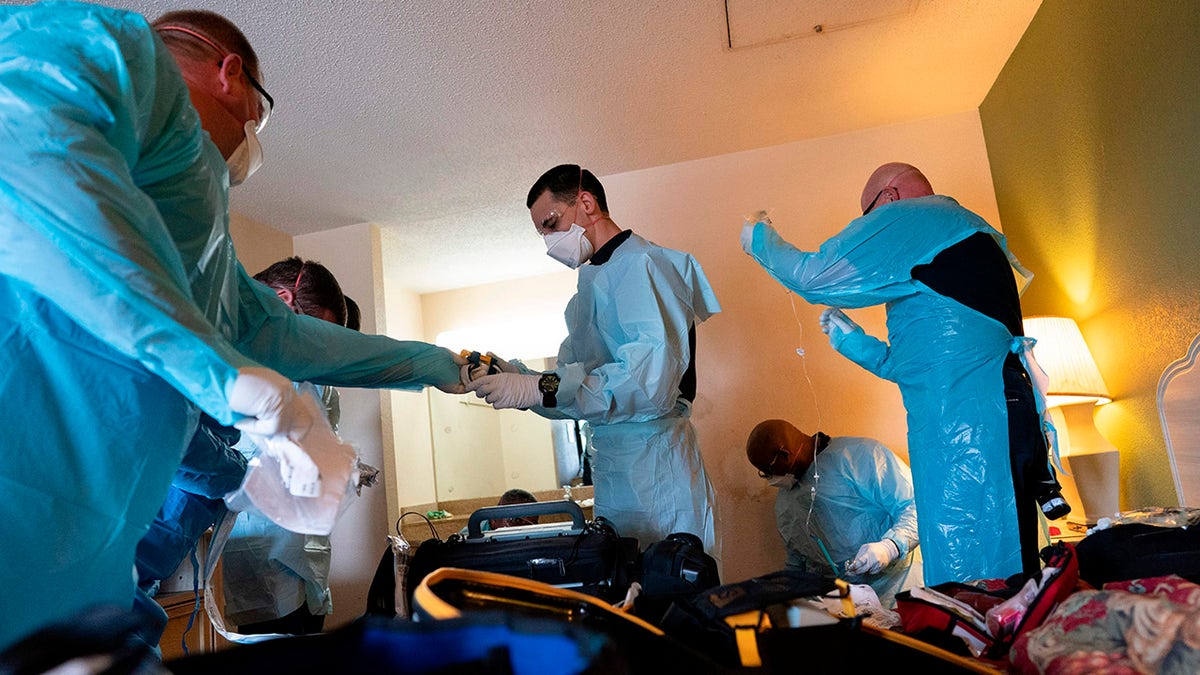Biden: 'People are learning to die with' COVID-19
Democratic nominee responds to President Trump's statement that Americans are learning to live with pandemic
President Trump on Friday warned of depression and addiction, which health professionals says is on the rise amid coronavirus lockdowns, during the final 2020 presidential debate.
Trump and 2020 Democratic nominee Joe Biden took opposing stances toward the country's future in the middle of a pandemic, with Biden telling the audience that the U.S. is "about to go into a dark winter" and the president disagreeing with that statement.
"I don't think we're going to have a dark winter at all," the president, who has been criticized for initially downplaying the severity of COVID-19 in the early months of the pandemic, said.

Democratic candidate former Vice President Joe Biden speaks to reporters before boarding his campaign plane at Nashville International Airport Thursday, Oct. 22, 2020. (AP Photo/Carolyn Kaster)
He went on to say that furthering lockdowns, however, could steer Americans down a darker emotional path.
“We can’t keep this country closed," Trump said. "This is a massive country with a massive economy. There’s depression, alcohol, drugs at a level nobody’s ever seen before. The cure cannot be worse than the problem itself."
Biden responded by saying he was "going to shut down the virus, not the country," adding that Trump's "ineptitude" is what caused the country to shut down.
"Why businesses have gone under, why schools have closed, why people have lost their living, and they are concerned," Biden said. "He should have been -- instead of in a sand trap at his golf course -- he should have been negotiating with Nancy Pelosi and the rest of the Democrats and Republicans..."
ESTIMATES SUGGEST DRUG OVERDOSES ON THE RISE SINCE CORONAVIRUS OUTBREAK
The number of Americans reporting symptoms of anxiety and depression since the outset of the virus reached an all-time high in September, particularly among young people, according to an October report from mental health nonprofit Mental Health America.

Firefighters and paramedics with Anne Arundel County Fire Department wear enhanced PPE, during the coronavirus pandemic, as they treat a patient in cardiac arrest as a result of a drug overdose on May 6, 2020. (Photo by ALEX EDELMAN/AFP via Getty Images)
The report found that 9.7% of U.S. youth are experiencing severe depression compared to 9.2% from the same time last year. Among U.S. adults, more than 8 in 10 people who took anxiety screenings in September had moderate to severe symptoms. The same rate was consistently true for those who took depression screenings between March and September.
CORONAVIRUS CREATES 'PERFECT STORM' FOR ADDICTION IN UNITED STATES
Alcohol and drug abuse has gone through the roof. At least 40 states have reported increases in opioid-related fatalities since COVID-19 lockdowns began, and several have reported increases in alcohol-related deaths, as well, according to an October issue brief from the American Medical Association (AMA), citing a number of national reports.
The Centers for Disease Control and Prevention also reported a 10% increase in overdose deaths during the first few months of 2020, with 19,416 overdose deaths; the CDC predicts more than 75,500 drug-related deaths this year.
CLICK HERE FOR THE FOX NEWS APP
The University of Michigan's Department of Psychology, which offers a number of remote resources for COVID-19 and substance abuse, says on its website that "COVID-19 related social isolation and stress can increase susceptibility to substance misuse, addiction, and relapse."
Those suffering from substance abuse may also be more susceptible to contracting the virus or experiencing complications with the virus, the website states.
The Substance Abuse and Mental Health Services Administration's National Helpline is a free, confidential, 24/7, 365-day-a-year treatment referral and information service (in English and Spanish) for individuals and families facing mental and/or substance use disorders: 1-800-662-4357

























